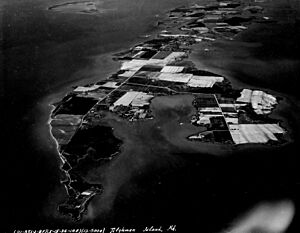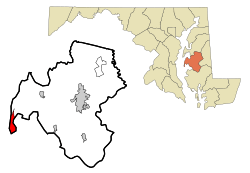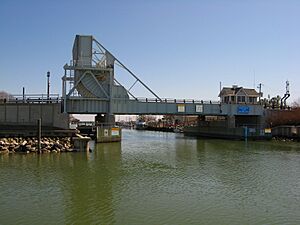Tilghman Island, Maryland facts for kids
Quick facts for kids
Tilghman Island, Maryland
|
|
|---|---|

Aerial view, 1930s
|
|

Location of Tilghman Island, Maryland
|
|
| Country | United States |
| State | Maryland |
| County | Talbot |
| Area | |
| • Total | 2.54 sq mi (6.57 km2) |
| • Land | 2.40 sq mi (6.21 km2) |
| • Water | 0.14 sq mi (0.36 km2) |
| Elevation | 7 ft (2 m) |
| Population
(2020)
|
|
| • Total | 807 |
| • Density | 336.67/sq mi (130.00/km2) |
| Time zone | UTC−5 (Eastern (EST)) |
| • Summer (DST) | UTC−4 (EDT) |
| ZIP code |
21671
|
| Area code(s) | 410, 443, and 667 |
| FIPS code | 24-77912 |
| GNIS feature ID | 1852602 |
Tilghman Island is a cool island located in the Chesapeake Bay. It's part of Talbot County in Maryland, USA. It's known as a 'census-designated place' (CDP). This means it's a community that the government counts for population, even though it's not officially a city or town.
Contents
Discover Tilghman Island's Past
How Tilghman Island Got Its Name
Long ago, this island was called Great Choptank Island. But in 1752, the Matthew Tilghman family became its owners. From that time on, everyone started calling it Tilghman Island.
Tilghman Island During the War of 1812
During the War of 1812, British soldiers briefly took over the island. They used it to get supplies for their army.
How Tilghman Island Grew
The community of Tilghman started to form around the 1840s. At first, people mostly farmed. But as cities like Baltimore and Washington grew, the island's economy changed. People started focusing more on catching oysters and fish. Steamboat services in the 1890s made it easier to send these goods to market.
Historic Boats and Places
Tilghman Island is home to many historic treasures. Several old boats called skipjacks are listed as important historic places. These include the E.C. Collier, the Elsworth, and the Hilda M. Willing. Other famous skipjacks are the Kathryn, the Maggie Lee, the Minnie V, and the Nellie L. Byrd.
You can also find the Ralph T. Webster, the Rebecca T. Ruark, the Reliance, the Ruby G. Ford, the Sigsbee, and the Virginia W. Besides boats, the Paw Paw Cove Site and the Sharps Island Light are also important historic spots.
Exploring Tilghman Island's Geography
Where is Tilghman Island Located?
Tilghman Island is located at 38°42′32″N 76°20′6″W / 38.70889°N 76.33500°W. This is its exact spot on a map!
How Big is Tilghman Island?
The island covers a total area of about 2.8 square miles (7.3 square kilometers). Most of this area, about 2.7 square miles (7.0 square kilometers), is land. The rest, about 0.1 square miles (0.26 square kilometers), is water.
Who Lives on Tilghman Island?
Population Facts and Figures
| Historical population | |||
|---|---|---|---|
| Census | Pop. | %± | |
| 2020 | 807 | — | |
| U.S. Decennial Census | |||
In 2010, about 784 people lived on Tilghman Island. There were 357 households, which are like homes where people live. About 246 of these were families. The island had about 560 housing units in total.
Most people living on the island were White (97.3%). A smaller number were African American (1.4%), Native American (0.5%), or Asian (0.5%). About 0.3% of the population had two or more races. People of Hispanic or Latino background made up 0.6% of the population.
Families and Age Groups
About 24.7% of households on the island had children under 18 years old. Most households (64.9%) were married couples living together. About 23.9% of all households were made up of people living alone.
The average household had 2.32 people, and the average family had 2.72 people. The population included people of all ages. About 19.2% were under 18, and 22.0% were 65 or older. The average age on the island was 46 years old.
Income and Economy
In 2010, the average income for a household on Tilghman Island was $32,763. For families, the average income was $38,304. The average income per person was $13,851.
About 8.7% of families and 17.7% of all people on the island lived below the poverty line. This included 24.4% of children under 18 and 8.9% of people aged 65 or older.
See also
 In Spanish: Tilghman Island (Maryland) para niños
In Spanish: Tilghman Island (Maryland) para niños


